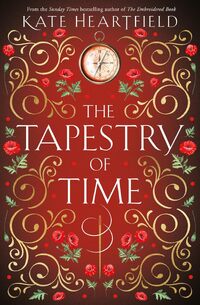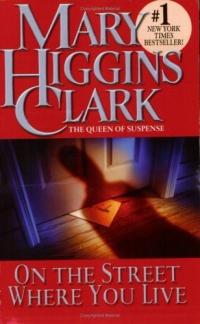 THE TAPESTRY OF TIME |
 Sunshine, secrets, and swoon-worthy stories—June's featured reads are your perfect summer escape. |

Purchase
Simon and Schuster Suspense, Mystery Psychological Excerpt of On the Street Where You Live by Mary Higgins ClarkChapter One Tuesday, March 20 He turned onto the boardwalk and felt the full impact of the stinging blast from the ocean. Observing the shifting clouds, he decided it wouldn't be surprising if they had a snow flurry later on, even though tomorrow was the first day of spring. It had been a long winter, and everyone said how much they were looking forward to the warm weather ahead. He wasn't. He enjoyed Spring Lake best once late autumn set in. By then the summer people had closed their houses, not appearing even for weekends. He was chagrined, though, that with each passing year more and more people were selling their winter homes and settling here permanently. They had decided it was worth the seventy-mile commute into New York so that they could begin and end the day in this quietly beautiful New Jersey seaside community. Spring Lake, with its Victorian houses that appeared unchanged from the way they had been in the 1890s, was worth the inconvenience of the trip, they explained. Spring Lake, with the fresh, bracing scent of the ocean always present, revived the soul, they agreed. Spring Lake, with its two-mile boardwalk, where one could revel in the silvery magnificence of the Atlantic, was a treasure, they pointed out. All of these people shared so much — the summer visitors, the permanent dwellers — but none of them shared his secrets. He could stroll down Hayes Avenue and visualize Madeline Shapley as she had been in late afternoon on September 7, 1891, seated on the wicker sofa on the wraparound porch of her home, her wide-brimmed bonnet beside her. She had been nineteen years old then, brown- eyed, with dark brown hair, sedately beautiful in her starched white linen dress. Only he knew why she had had to die an hour later. St. Hilda Avenue, shaded with heavy oaks that had been mere saplings on August 5, 1893, when eighteen-year-old Letitia Gregg had failed to return home, brought other visions. She had been so frightened. Unlike Madeline, who had fought for her life, Letitia had begged for mercy. The last one of the trio had been Ellen Swain, small and quiet, but far too inquisitive, far too anxious to document the last hours of Letitia's life. And because of her curiosity, on March 31, 1896, she had followed her friend to the grave. He knew every detail, every nuance of what had happened to her and to the others. He had found the diary during one of those cold, rainy spells that sometimes occur in summer. Bored, he'd wandered into the old carriage house, which served as a garage. He climbed the rickety steps to the stuffy, dusty loft, and for lack of something better to do, began rummaging through the boxes he found there. The first one was filled with utterly useless odds and ends: rusty old lamps; faded, outdated clothing; pots and pans and a scrub board; chipped vanity sets, the glass on the mirrors cracked or blurred. They all were the sorts of items one shoves out of sight with the intention of fixing or giving away, and then forgets altogether. Another box held thick albums, the pages crumbling, filled with pictures of stiffly posed, stern-faced people refusing to share their emotions with the camera. A third contained books, dusty, swollen from humidity, the type faded. He'd always been a reader, but even though only fourteen at the time, he could glance through these titles and dismiss them. No hidden masterpieces in the lot. A dozen more boxes proved to be filled with equally worthless junk. In the process of throwing everything back into the boxes, he came across a rotted leather binder that had been hidden in what looked like another photo album. He opened it and found it stuffed with pages, every one of them covered with writing. The first entry was dated, September 7, 1891. It began with the words "Madeline is dead by my hand." He had taken the diary and told no one about it. Over the years, he'd read from it almost daily, until it became an integral part of his own memory. Along the way, he realized he had become one with the author, sharing his sense of supremacy over his victims, chuckling at his playacting as he grieved with the grieving. What began as a fascination gradually grew to an absolute obsession, a need to relive the diary writer's journey of death on his own. Vicarious sharing was no longer enough. Four and a half years ago he had taken the first life. It was twenty-one-year-old Martha's fate that she had been present at the annual end-of-summer party her grandparents gave. The Lawrences were a prominent, long-established Spring Lake family. He was at the festive gathering and met her there. The next day, September 7th, she left for an early morning jog on the boardwalk. She never returned home. Now, over four years later, the investigation into her disappearance was still ongoing. At a recent gathering, the prosecutor of Monmouth County had vowed there would be no diminution in the effort to learn the truth about what had happened to Martha Lawrence. Listening to the empty vows, he chuckled at the thought. How he enjoyed participating in the somber discussions about Martha that came up from time to time over the dinner table. I could tell you all about it, every detail, he said to himself, and I could tell you about Carla Harper too. Two years ago he had been strolling past the Warren Hotel and noticed her coming down the steps. Like Madeline, as described in the diary, she had been wearing a white dress, although hers was barely a slip, sleeveless, clinging, revealing every inch of her slender young body. He began following her. When she disappeared three days later, everyone believed Carla had been accosted on the trip home to Philadelphia. Not even the prosecutor, so determined to solve the mystery of Martha's disappearance, suspected that Carla had never left Spring Lake. Relishing the thought of his omniscience, he had lightheartedly joined the late afternoon strollers on the boardwalk and exchanged pleasantries with several good friends he met along the way, agreeing that winter was insisting on giving them one more blast on its way out. But even as he bantered with them, he could feel the need stirring within him, the need to complete his trio of present-day victims. The final anniversary was coming up, and he had yet to choose her. The word in town was that Emily Graham, the purchaser of the Shapley house, as it was still known, was a descendant of the original owners. He had looked her up on the Internet. Thirty-two years old, divorced, a criminal defense attorney. She had come into money after she was given stock by the grateful owner of a fledgling wireless company whom she'd successfully defended pro bono. When the stock went public and she was able to sell it, she made a fortune. He learned that Graham had been stalked by the son of a murder victim after she won an acquittal for the accused killer. The son, protesting his innocence, was now in a psychiatric facility. Interesting. More interesting still, Emily bore a striking resemblance to the picture he'd seen of her great-great-grandaunt, Madeline Shapley. She had the same wide brown eyes and long, full eyelashes. The same midnight-brown hair with hints of auburn. The same lovely mouth. The same tall, slender body. There were differences, of course. Madeline had been innocent, trusting, unworldly, a romantic. Emily Graham was obviously a sophisticated and smart woman. She would be more of a challenge than the others, but then again, that made her so much more interesting. Maybe she was the one destined to complete his special trio? There was an orderliness, a rightness to the prospect that sent a shiver of pleasure through him. Copyright © 2001 by Mary Higgins Clark Excerpt from On the Street Where You Live by Mary Higgins Clark |
|
| |||
|
||||



 © 2003-2025
© 2003-2025